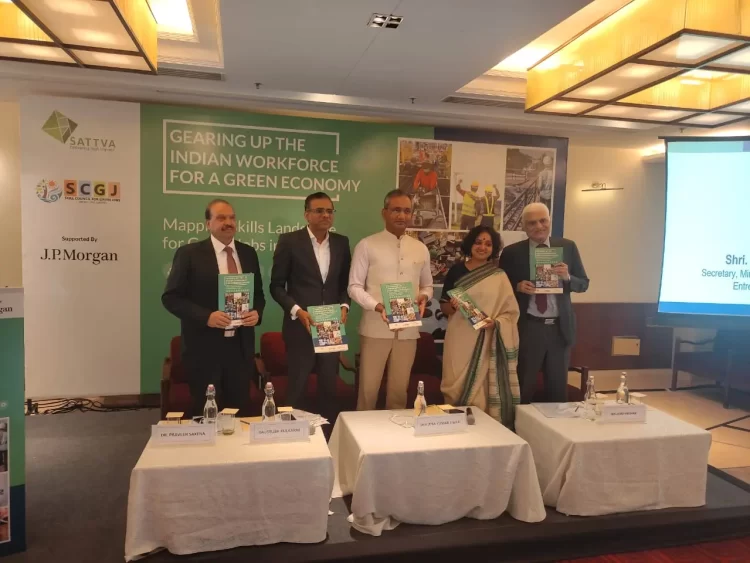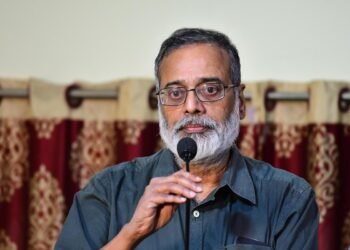The report identifies 5 Big Bet initiatives that can address skills needs and set the pace for India’s green growth.
New Delhi: India has the potential to create up to 35 million green jobs by 2047 across traditional and emerging sectors, including in renewable energy, waste management, electric vehicles, green construction and sustainable textiles. The findings are part of a report titled – Gearing Up the Workforce for a Green Economy – that was launched today by Skill Council for Green Jobs and Sattva Consulting and supported by J.P. Morgan.
The report identifies employment potential in the green economy and the catalytic role that philanthropy can play in addressing skills needs and ensuring equitable access to green jobs. It estimates that up to 35 million green jobs will be created by 2047 across emerging and traditional sectors. Sectors such as renewable energy, green hydrogen, waste management, electric vehicles, sustainable textiles and green construction are key sectors that will drive green growth in India and host the highest number of green jobs, especially in urban and peri-urban areas.
The report further states that the promised green growth is an opportunity for the country to create meaningful livelihoods through two interconnected strategies — leverage the global need for skilled human resources to help itself and other countries achieve net zero targets and ensure just and well-managed transitions for labour in traditional industries that are impacted as a result of these shifts.
In his Keynote Address, A. K. Tiwari, Secretary, Ministry of Skill Development and Entrepreneurship (MSDE) said: ‘’Green growth and green jobs are a priority area for the government, and we are fully committed and continuously engaging with industry and other stakeholders to ensure that youth are suitably skilled, certified, and fully prepared to meet the evolving requirements of the industry.”
The research outlines five Big Bets initiatives that have the potential to create jobs at scale for people from disadvantaged socio-economic backgrounds. These include reskill and upskill existing workforce, training entry-level workforce, supporting entrepreneurship-led models, fostering diversity & inclusion, and ensuring formalisation, and protections and working conditions of green jobs. In EV for instance, the study recommends establishing a network of women entrepreneur-led after-sales services and charging centres. Similarly, it highlights the need to upskill existing workforce across the solar value chain to meet demand for a 12-fold increase in jobs.
Speaking about the report, Kaustubh Kulkarni, Senior Country Officer, J.P. Morgan, India & Vice Chairman – Asia Pacific said: “At J.P. Morgan, we are committed to help advance a more inclusive and sustainable economy in India. The 5 Big Bets identified in the report underscore the crucial role philanthropy can play in creating an inclusive skills development system to train the existing and incoming workforce and ensure the transition towards an economy where no one is left behind.”
Kolluru Krishan, Former Chairman, SCGJ and Chairman, CVC Biorefineries said: ‘’While there exists a high demand for green skilled workforce, currently industry players face challenges in hiring skilled and certified workers. Collaborative actions from the industry, Government and various key actors across the ecosystem are needed to deliver targeted skilling programs at the required scale’’.
The findings are based on interactions with over 85 industry leaders, experts and representatives from skills ecosystem and over 2000 youth.
Aarti Mohan, Co-Founder and Partner, Sattva Consulting, said that ‘’the transition to a green and resilient economy requires new and green skills, both for the emerging and future jobs and for existing jobs that are evolving.’’ She mentioned that ‘while some more efforts are needed to address gaps in skilling and employment for vulnerable population, the fast-evolving technology and the changing structure of the labour market hold enormous potential for a more inclusive workforce across the green business sector”.
Dr Praveen Saxena, CEO, SCGJ said that transition towards a green economy will trigger significant changes in technology, policies, job market along with aspirations of our youth thus creating the need for new qualifications, skillsets and models for training delivery.






















